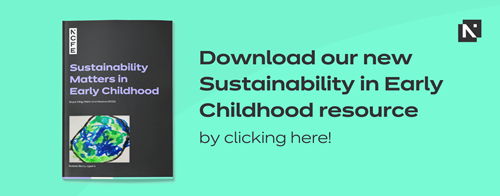Why are books important for a child's development?
Janet King, Sector Manager for Education and Childcare at NCFE, explores the role of books in opening up conversations about often difficult topics. From the environment and food banks to sexuality and war, she picks out seven examples of children’s books that discuss modern society.
With a lifelong love of books, I jumped at the chance to write a short blog for World Book Day. But rather than talk about the latest best seller, I want to explore the role of books in the lives of others – especially children.
Books, like music, can have an immediate effect; a sort of magnetism that connects with emotions and even very young children can identify their favourite books. They are powerful, fuel dreams, set aspirations, share facts, whilst also exposing fantasy, and offer opportunity for so much more.
Through books children can learn about the world around them. Along with the obvious holistic developmental outcomes that books can foster, a strong sense of empathy stands out for me. Books that help us to value and respect, appreciate and acknowledge.
During work on NCFE’s sustainability resource for early childhood development, I discovered so many that do just that. In an effort to raise an understanding, books are identified that offer opportunity to discuss the significance of humanity and human kindness. They remind us, through words for children, that each of our experiences may be very different.
Research shows that fundamental values and attitudes are formed in early childhood, so whether you’re working in early years or a parent looking for inspiration, here are my top choices for discussing a range of societal issues with children.
1. Home Builders by Varsha Bajaj
Welcome to a serene woodland where lots of expectant animal parents are in their nesting phase – that is, busy preparing safe, cosy homes for their growing families.
As they dig, tunnel, gnaw, and gather, they create dens, burrows, lodges, and, of course, nests. Soon the woods are full of new little ones peeping, crawling, romping, and snuggling. With artwork so gorgeous that it feels like an invitation into the scenery it’s depicting, readers will be eager to join them in their beautiful home.
2. It’s a No Money Day by Kate Milner
“My mum works really hard and knows lots of fun things to do that don’t cost any money. But when there’s nothing left in the cupboards we have to go to the foodbank. Maybe one day things will be different...”
This is a moving insight into the rise of foodbanks from the perspective of society's most vulnerable, and an essential book to help develop empathy in young children.
3. Stella Brings the Family by Miriam Schiffere
Stella’s class is having a Mother’s Day celebration, but what’s a girl with two daddies to do? It’s not that she doesn’t have someone who helps her with her homework or tucks her in at night. Stella has her Papa and Daddy who take care of her, and a whole gaggle of other loved ones who make her feel special and supported every day.
She just doesn’t have a mom to invite to the party. Fortunately, Stella finds a unique solution to her party problem in this sweet story about love, acceptance, and the true meaning of family.
4. I Like Myself! by Karen Beaumont
High on energy and imagination, this ode to self-esteem encourages children to appreciate everything about themselves – inside and out.
If you’re looking for a follow up activity, ask each child to say something they like about themself and another child in their group. You could even make a class book and call it We like ourselves! The message is about empowerment and that we’re all the same.
5. My Name is Not Refugee by Kate Milner
A young boy discusses the journey he is about to make with his mother. They will leave their town, she explains, and it will be sad but also a little bit exciting. They will have to say goodbye to friends and loved ones, and that will be difficult. They will have to walk and walk and walk, and although they will see many new and interesting things, it will be hard at times too.
A powerful and moving exploration that draws the young reader into each stage of the journey, inviting the chance to imagine the decisions he or she would make. Linked to this, our Settling in Britain is also a useful resource for early years practitioners.
6. Coming Home by Michael Morpurgo
A plucky little robin sets out on an epic journey. Through dark forests, driving rain, clapping thunder and flashing lightning. Across frozen wastes, huge mountains and stormy seas he flies. And all the while he’s dreaming of home. Of her. But will he ever get there?
This book delves into important processes and changes in the natural world, including the seasons and patterns of migration.
7. The Peace Book by Todd Parr
This provides positive and hopeful messages of peace in an accessible, child-friendly format. It delivers a timely and timeless message about the importance of friendship, caring and acceptance.
There are so many books that help us all to appreciate different perspectives, unravel our sense of truth and knowledge, and begin to see things through a much more agile and human lens.
Our values and attitudes are arguably the most agile during early childhood but reading, reflecting, thinking, and feeling can be powerful at any time in our lives.
If you’re feeling inspired, why not consider a career in early years? Find out more by visiting our dedicated page.
In an effort to raise an understanding, books are identified that offer opportunity to discuss the significance of humanity and human kindness. They remind us, through words for children, that each of our experiences may be very different.


From learning to earning: the importance of vocational and technical education
Our Senior Product and Commercial Manager, Rachel Dillon, breaks down what vocational and technical education (VTE) is, whilst exploring the many benefits that this style of learning can offer pupils.

From Duolingo to Wordle: how educational games are changing the way we learn
Ever wondered why gamified learning is so popular? Here, our Sector Manager for Digital, James Lane, explores how educational games work, as well as the benefits that they can bring to learners.

Learner stories: "Skills and knowledge that will last a lifetime"
Abbigail Parkin of Scarborough Sixth Form College is currently studying for an Education and Early Years T Level. We caught up with her to see how the T Level is preparing her for higher education and beyond.


